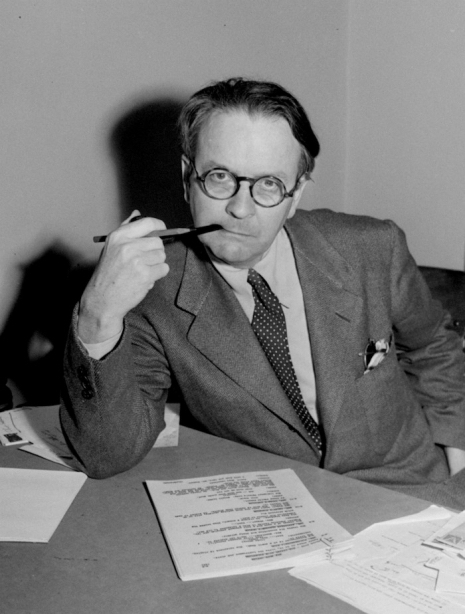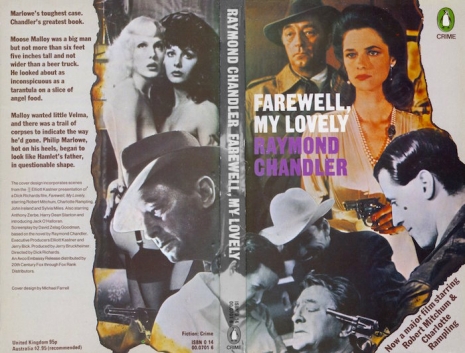
Elliott Gould as Philip Marlowe in Robert Altman’s film version of Raymond Chandler’s ‘The Long Goodbye.’
Raymond Chandler wanted to call his second Philip Marlowe novel The Second Murderer. His publisher Blanche Knopf nixed the idea. So, Chandler suggested Zounds, He Dies, a line spoken by the Second Murderer in Shakespeare’s King Richard III.
Knopf was deeply unimpressed. Eventually, the pair agreed on Farewell, My Lovely which is one hell of a killer title.
This is one of those little sidebars of information contained in Raymond Chandler’s Notebooks which were published long after the great man’s death in 1977. Chandler kept a variety of notebooks during his life. Usually small leather pocketbooks or large writing pads filled with daily events, observations, private thoughts, and details of work in progress. Unfortunately, the bulk of these notebooks was destroyed by Chandler when he was preparing to move to England after his wife Cissy’s death in 1954. Only two notebooks survived. Extracts from these two volumes supplied the content for The Notebooks of Raymond Chandler.
On occasion, Chandler has been unfairly given the rap that he was never as good as his rival Dashiell Hammett, as he made crime writing more about imagination than real hard-bitten, hard-earned experience. Hammett had been a Pinkerton detective. Chandler was a drunk oil exec down on his luck. He was a “gasbag,” according to the Demon Dog James Ellroy. His fictional hero Philip Marlowe was paraded through a series of hoops and jumps which were sometimes incoherent. It’s not a view I would ever agree with. I prefer Chandler to Hammett but think both writers took their writing very seriously.
This can be seen from what’s left of Chandler’s notebooks. He was a very serious writer, who worked damned hard at getting things just exactly right. In his notebooks, he practiced his writing and tried out his ideas. He also used them as a source book for research. From lists of street slang to working out titles, similes, and even writing parodies of other authors like Ernest Hemingway.
Among the many book titles listed in the two remaining notebooks are such unlikely gems:
The Man with the Shredded Ear
All Guns are Loaded
The Corpse Came in Person
They Only Murdered Him Once
The Diary of a Loud Check Suit
Quick, Hide the Body
Stop Screaming—It’s Me
The Black-Eyed Blonde
Thunder-Bug
Everyone Says Good-bye Too Soon
You get the idea Chandler was a fun guy if just a little too shy to get the party swinging.
What interested me about Chandler’s notebooks (well, apart from his notes on writing crime fiction) were the long lists of slang he compiled from the streets and from newspapers, a few of which I’ve shared below.
Pickpocket Lingo
(Maybe New York only)
Saturday Evening Post, October 21, 1950
Cannon—General term for pickpocket (Dip is unused, obsolete)
Live cannon—A thief who works on normally situated people, as opposed to a roller (a lushworker) who frisks drunks. Both men knock their victims. Rousters walk with the victim pretending to help; sneak workers don’t touch him unless he is passed out or near to it.
Pit worker—Inside-breast-pocket expert.
Moll buzzer—Operator on women’s handbags.
Sneeze—Arrest.
Short—Bus, street car, any public conveyance.
Stride—Walking (“On the stride.”)
Shed—Railroad station.
Tip—Crowd.
Bridge—Pocket.
Button—Police badge.
Kiss the dog—Work face to face with the victim.
Tail pits—Right and left side pockets of jacket.
Pratt—Rear trouser pocket.
Stall—Accomplice who creates confusion to fix the victim’s attention.
Right fall—Grand larceny conviction. To obtain there must be testimony that the accused had his hand in the victim’s pocket and was caught with the goods still on him. Most arrests are for “jostling,” which is a misdemeanor good for no more than six bits (months). A shove is enough when the shover is a known operator.
Hanger binging—Opening women’s handbags without stealing the bag.
Tweezer—Change purse.
Stiff—A newspaper or other shield to hide operations.
Wire or hook—The actual live cannon, as opposed to the stall.
Shot—A young pickpocket just starting to work (Harlem cant).
Fan the scratch—To locate money in a pocket without putting the hand in, i.e., by touch.
Dunnigan worker—Thieves who hang around comfort stations hoping for a coat left on a hook.
Note: A cannon never takes your money. He forks his fingers over it and moves away from it with a shove.

The great Raymond Chandler.
San Quentin Prison Slang
Quoted by former Warden Holohan in Los Angeles Times.
(Well-known terms omitted.)
Beak - Judge
Buried - held incommunicado
Broom - Disappeared hastily
Bonarue (Fr.) - Good
Box - Safe and also phonograph
Bank - Shot of dope
Back door parole - Die in prison
Blow your copper - Lose good conduct credits
Buck - Priest
Case dough - Limited dough
Caught in a snowstorm - Cocained up
Crazy alley - Fenced-in section for daffy prisoners
Copper-hearted - Informer by nature
Crib - Safe
Crow McGee - No good, not real
Cecil - Cocaine
Croaker - Doctor
Copper - Good prison records
Cop a heel - Assault from behind
Dinah - Nitroglycerine
Dropper - Paid killer
Duffer - Bread
Eye - Detective
Fog - Shoot
Fall money - Bail and legal fees
Fin - Five dollar bill
Fin up - Five years to live
Grease - Protection money
Glom - Steal, grab
Gum heel - Cop
Herder - Guard in prison
Hincty - Suspicious
Jinny - Blind pig
Lifeboat - Pardon, commutation of sentence
McCoy - Genuine (opposed to Crow McGee)
Nose - Police spy
On the Erie - Shut up! someone is listening
Office - Signal
On the muscle - Quarrelsome, ready for trouble
Put the cross on - Mark for death
Roscoe - Gat, hand gun
Shag - Worthless
Slam off - Die (not kill)
Swamp - Arrest
Slim - Police spy
Sneeze - Kidnap
Spear - Arrest
Shin - Knife, contraband weapon, shotgun
Siberia - Solitary confinement cells
Tommy Gee - Machine gunner

Cover to the movie tie-in edition of ‘Farewell, My Lovely’ featuring Robert Mitchum as Marlowe.
Narcotics Squad Slang
pin-jabber—hypo user
sniffer—snuffer
dodo—any addict
gow—a dope, as “gowed up”
kick the gong around—use dope (Harlem)
daisy crushers—shoes
pearl diver—dish washer
fancy pants—(verb) to act cagily or coyly
Hard Harry—a hard guy
Slang and Hard Talk
chicago lightning—gunfire
dip the bill—take a drink
grape—liquor
cough yourself off—beat it
eel juice—liquor
creased, bent—knocked off, also stolen
circulation drops—drinks
lip—lawyer
squibbed off—shot
new street—new girl
give her hello—say hello to her
kick the joint—break in
under glass—in prison, caught
Hollywood Slang
baggage-smasher—clumsy person
blinker—camera
duchess—a girl in the money
fluff—baby doll
footfever—hurry
garbo—a highhat
jail break—time out to eat
mob it—break formation
queen bee—show off
sock the clock—punch the time clock
toots—chorus boy (getting stale)
X ray—still photo
zubber—a cane and spats guy
Below, an interview between Chandler and Ian Fleming recorded by the BBC in 1958, where the two authors compare notes on their fictional heroes Philip Marlowe and James Bond, the kinds of villains they meet, the differences between the English “tea and muffins” detective and the American private eye. Chandler describes the particulars of a Mafia hit and declares his amazement at how quickly Fleming could write a Bond novel.